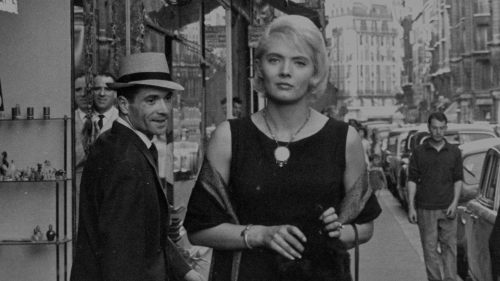BROAD CINEMA: Adapting The Fiction And Real-Life Jane Austen With MANSFIELD PARK
From Alice Guy-Blaché to Ava Duvernay, women have been integral to cinema for the last 120 years. Broad Cinema is a weekly column that will feature women who worked on films that are playing this month at the Alamo Drafthouse. From movie stars to directors, from cinematographers to key grips, Broad Cinema will shine a spotlight on women in every level of motion picture production throughout history.
This week we celebrate Patricia Rozema, whose Mansfield Park which is playing at Alamo Drafthouse theaters this month. Get your tickets here.
--
Director Patricia Rozema knew that her 1999 rendition of Mansfield Park would inherit the controversies of Jane Austen’s text. Taking measures, she tweaked content in the film while retaining the plot framework for better or worse in the scrutiny of critics. To enact some alternatives, she employs other Austen sources. In the opening credits, a Jane Austen purist can easily miss that “[Austen’s] letters and her early journals” is included in the “Based On” credits below the Mansfield Park title.
“[This film is] a tangled and dark work with a kind of atmosphere of sexuality and menace on the whole,” Rozema admitted. Although she commended the merits of film adaptations of Sense and Sensibility and Persuasion, she found them “too pretty” and perhaps too safe. She pursued her own adaptation where the Regency living room felt more threadbare minimalistic instead of the commonplace wallpaper-flowery and bright floral set pieces of the Austen film-verses.
Rozema had confessed she did not feel the protagonist, Fanny Price, considered Jane Austen’s feeblest heroine with extreme anxiety and fainting spells, could carry a film.
“It was very clearly [Jane Austen’s] choice—to make Fanny Price sort of insufferable. Not allowed to say that, am I? No. It really was a choice, and it's hard to know exactly what the reason was for her choice. I mean, it's kind of divided scholars for years, and it's a completely interesting debate.”
Even if Fanny has a stronger physical and mental constitution than in the text, that does not mean Rozema necessarily invalidated the emotionally frail Fanny in the pages. When reading the source material, Rozema was engaged in the heroine’s plight and “status as an outsider,” both among her patronizing relatives and as one of Austen’s backboneless (but still valuable) heroines. Portrayed by Frances O’Connor, Fanny Price differs extensively from her novel counterpart but does retain reserve and internalized misery. For instance, she socializes only with her cousin and love Edmund and becomes only mildly snarkier to her pretentious relatives toward the end. O’ Connor’s Fanny is not a reinterpretation of the pages but a refurnishing for the screen with more agency. The book’s first chapters focus on the supporting characters talking about Fanny as if she’s a new ugly vase they don’t want. Onscreen, we see young Fanny in the foreground as she inadvertently eavesdrops on her snooty relatives’ disparaging comments. O’ Connor’s Fanny on-screen has humble origins of a writer and is essentially an avatar of a young Jane Austen with biting wit. But Rozema’s screenplay stays close to Fanny’s introverted spirit with the substance of the heroine’s voice going on her pages or the ears of people close to her.
Rozema also fashions a more present temptation in the love triangle. In the book, while Fanny does have gratitude toward the self-absorbed Henry Crawford for his “selfless” deeds to win her heart, ultimately she has zero romantic interest, and her “no” to his marriage proposal is her low-key triumph. In the movie, she accepts Henry’s courtship on her own terms since she finds his romantic traits magnetizing at times, but after reflecting on her own insecurities, her sudden mind-swerve to “no” is still validated. Though she meditates on whether she handled the predicament the best she could.
Savvy about modern sensibilities, there’s also a major enhancement. In the pages, Fanny’s throwaway line, “Did not you hear me ask him about the slave-trade last night?” has perked up and inflamed the discourse among literary circles. How could Jane Austen, a self-proclaimed reader of abolitionists, gloss over the slavery aspects? So as an homage to the modern criticism, Rozema inserts a more pervasive presence of slavery that haunts the plot proceedings, whether in conversation or in gruesome sketches of sexual violence, although no African Americans are present on-screen (though the soundtrack invokes their screams). While the slavery institution cannot be resolved in the domestic sphere of Austen’s narrative, it still lingers in the audience’s consciousness. Even if speculative, it’s worth examining the virtual absence of these subjects in Austen’s regency-tinted books.
Critics have ambivalent opinions about Rozema’s adaptational deviations. Some find it deficient as an Austen adaptation. Some laud it for its audacity. Under Rozema’s judgment, fidelity to the spirit of Jane Austen is not in the literal translation.
--



